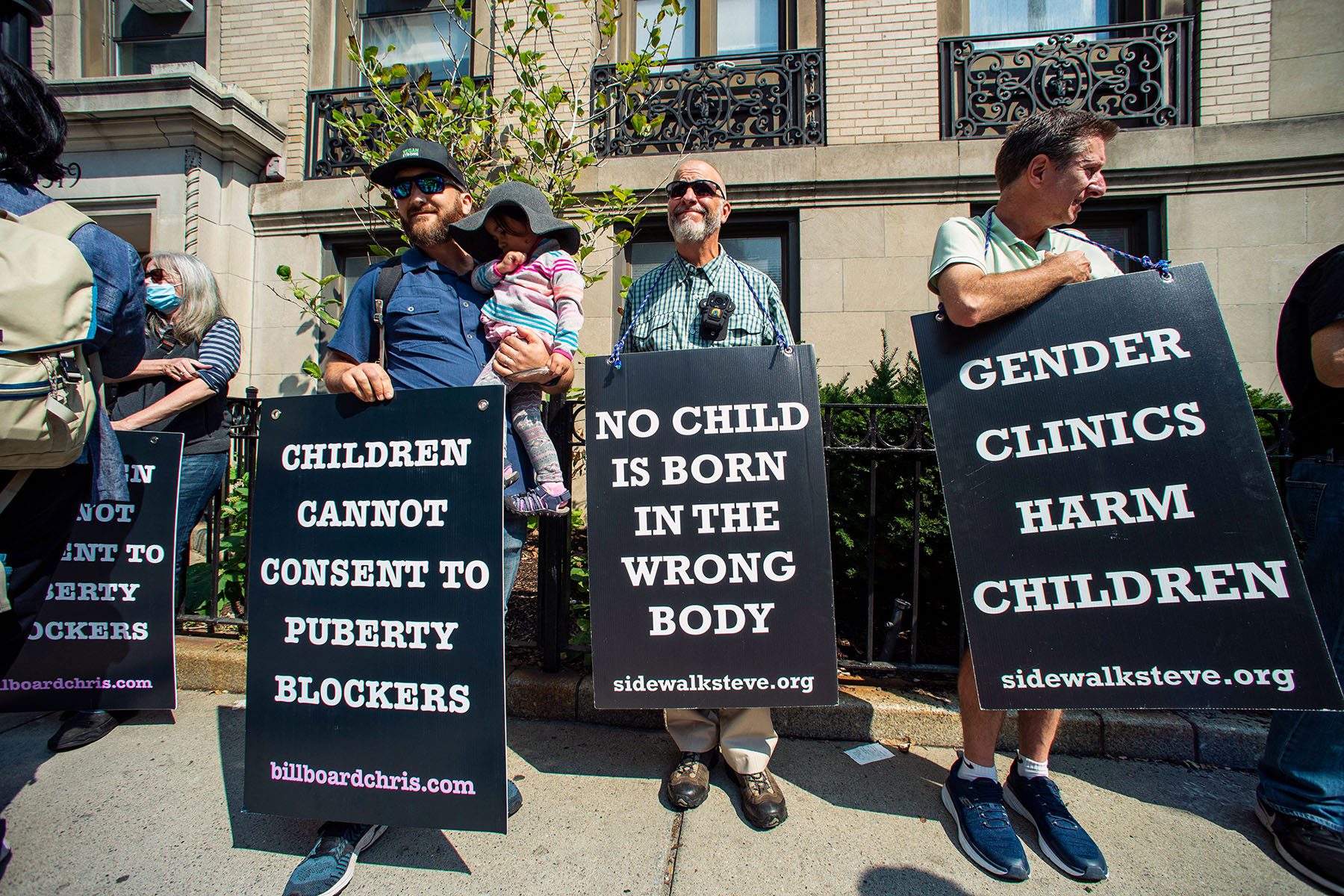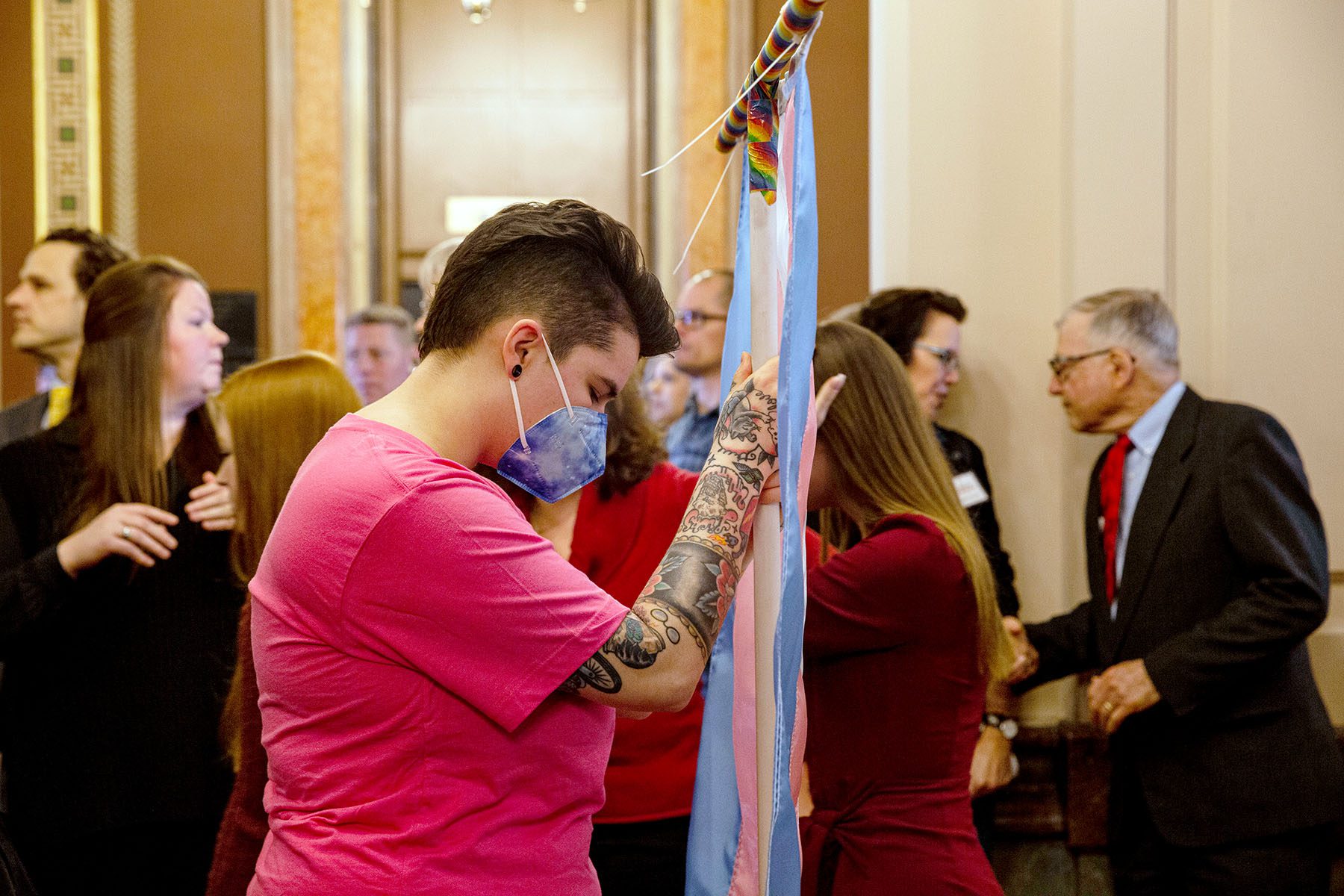Iowa’s governor said knowing “boys from girls” was as vital as knowing the difference between liberty and tyranny.
The GOP candidate for attorney general in Nevada called for fewer transgender people to exist, using and then later doubling down on a slur.
And the Republican nominee for governor in Illinois used a debate question on abortion access to spread a conspiracy theory about the current governor’s family and portray gender-affirming care for trans youth as “experimental gender surgeries.”
Republicans in 2022 midterm races are embracing more anti-transgender rhetoric than in any year that LGBTQ+ experts can remember. The rhetoric is frequently tied to “parental rights,” which is invoked by proponents of bills to remove information about LGBTQ+ people from schools and libraries or keep trans youth out of sports. In ads and on the stump, candidates are sharing incorrect, inflammatory statements that are often used as a basis to restrict gender-affirming care.
Outside groups, notably the America First Legal Foundation and the American Principles Project super PAC, are adding more fuel to the fire. A recent ad from the American Principles Project, described by President Terry Schilling as the group’s “closing ad in the 2022 election,” uses photos of early surgery scars from transgender people, whose faces are blurred, and accuses the Biden administration and Democrats of “pushing transgender drugs and surgeries on kids” due to their support of the Equality Act.
“It’s on another level from prior years,” said David Stacy, government affairs director for the LGBTQ+ rights organization Human Rights Campaign (HRC). The rhetoric is harsher, and more mainstream Republicans, notably gubernatorial candidates, are willing to use it on the stump, he said.
Anti-trans ads have aired on TV and streaming services in at least 25 states during the midterms, HRC found. The group tracked $50 million — including $4 million in radio ads from America First Legal, founded by former Trump adviser Stephen Miller — being poured into TV, streaming, radio and digital anti-trans ads, which mostly targeted parents with misinformation on gender-affirming care for trans kids.

Gender-affirming surgeries are extremely rare for trans youth, who typically receive puberty blockers as part of transitioning at an early age, and later hormone therapy, to alleviate the distress of gender dysphoria.The process of getting a prescription and treatment generally takes months or years of working with medical professionals.
American Principles Project director of policy Jon Schweppe said on a Missouri radio show in September that the organization pledged to spend $10 million across six states. The group, he said, is focused on gender-affirming care for trans youth, which he equated to Democrats trying to sterilize children through sex changes — a practice that does not happen — as well as trans youth playing school sports aligning with their gender identity and “the effort in schools to sexualize kids.”
“These lies and the propaganda that are in these attacks are directly responsible for increased stigma, discrimination, and violence against transgender and nonbinary people,” said Geoff Wetrosky, HRC campaign director.
In addition to the risk of increased violence from campaign ads, advocates fear that candidates will translate their own rhetoric into anti-LGBTQ+ policies if they are elected into office and will be more emboldened to spread this rhetoric in 2024 if Republicans do well across the board.
“If people who are running on an anti-trans platform are successful in this November election, I think it’s going to unleash an even more intense, sustained effort to capitalize politically on vulnerable trans kids,” said Chris Erchull, staff attorney at GLBTQ Legal Advocates & Defenders (GLAD).
It also could have a chilling effect. Sean Meloy, vice president of political programs at Victory Fund, worries that if anti-LGBTQ+ Republicans do well in the midterms, it “will put up even higher walls for LGBTQ candidates trying to step forward.”
For some politicians, this election cycle has inspired pledges of a renewed push for anti-trans legislation. Texas Gov. Greg Abbott, when pressed by a conservative radio host, promised that if he is reelected, he’ll back legislation against gender-affirming care for trans youth, The Washington Post reported.
Although anti-trans views are hardly the core focus of most candidates’ campaigns, and it’s unclear how successful anti-trans rhetoric will be in swaying voters, many Republicans are prioritizing it as a key way to reach their base — and advocates are worried about the damage it will cause.

“It’s signaling to their entire voting base that trans people are not who we say we are, that there is some virtue in refusing to be respectful to trans people,” said Ari Drennen, LGBTQ+ program director for Media Matters, a progressive nonprofit and media watchdog. Far-right media is helping to spread the rhetoric further, she said, as outlets like Newsmax elevate campaign ads and host candidates to discuss anti-trans views.
“This is an all-out assault from the right-wing media,” Drennen said.
Across the country, ads in support of Republican contenders use anti-trans rhetoric to attack Democrats and further spread anti-trans rhetoric.
In Florida, the state’s Republican senatorial campaign committee released an ad accusing Democratic Florida state senate candidate Joy Goff-Marcil of being backed by advocates of “free sex-change operations for minors.”
A campaign ad against Michigan’s ballot measure codifying abortion access in the state falsely claims that the measure would enable trans youth to receive puberty blockers without parental consent. At least some voters in the state have been confused by the misinformation, as a local outlet in Detroit published a fact-check in response to a reader seeking clarification on the measure.
Another American Principles Project ad urges voters to protect their children by voting against Democrat Abigail Spanberger, who’s running for reelection in Virginia’s 7th Congressional District. It attempts to tie her to inaccurate depictions of gender-affirming care for trans youth, which the ad falsely portrays as a way to “chemically castrate” children.
In Texas, Dallas-area voters started receiving mailers this past weekend — paid for by the America First Legal Foundation — accusing President Joe Biden and Democrats of “pushing radical & irreversible gender experiments on children,” The Dallas Morning News reports.
“The far right used to use a lot of dog whistles and coded language, and they’re not even hiding any longer what it is they’re really trying to do, which is further marginalize the trans community and further move the trans community into the shadows through direct attacks,” said Zeke Stokes, GLAAD’s former chief programs officer who now consults the LGBTQ+ media advocacy organization on its voter engagement.
Some GOP candidates — like Iowa Gov. Kim Reynolds, plus Sen. Rand Paul of Kentucky and South Dakota Gov. Kristi Noem — are releasing their own campaign ads that use anti-trans rhetoric. Paul and Noem, both running for reelection, have dedicated campaign ads against trans students playing in sports that match their gender identity. Noem has stood out as a candidate working early and hard to tout her support of anti-trans legislation to voters.
Paul’s campaign has also taken anti-trans rhetoric to stump speeches. “I wouldn’t expect the Democrats to know what a recession is, they can’t even define what a woman is,” said Kelley Paul, speaking in her husband’s place at Kentucky’s annual Fancy Farm Picnic.
Other candidates, including South Carolina Gov. Henry McMaster, a Republican, are tying anti-trans rhetoric to broader anti-LGBTQ+ stances. McMaster said at a debate this month that he still opposes gay marriage — as well as trans students playing in sports that match their gender identity.
Reynolds, Paul, Noem and McMaster are all heavily favored to win reelection.

Even if the anti-trans rhetoric doesn’t clearly help Republicans attract voters, Stokes doesn’t expect it to go away anytime soon. He expects to see politicians double down on the rhetoric, especially in state legislatures, which have introduced another record year of anti-trans and anti-LGBTQ+ bills.
“I think those who have weaponized these issues are going to believe that they worked, even in places where perhaps they didn’t win,” he said.
There are still some bright spots, Wetrosky said — LGBTQ+ representation among those running for office is growing. A record number of transgender, nonbinary and gender nonconforming candidates ran this year, according to the Victory Fund, and LGBTQ+ candidates ran in all 50 states for the first time.
“That representation matters, in the face of these attacks, to have somebody on the floor of the chamber where these bills are being debated, and to able to speak to them from their own personal perspective is incredibly powerful. And that gives me hope,” Wetrosky said.
Correction: An earlier version of this article misspelled the name of Ari Drennen.







